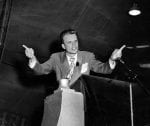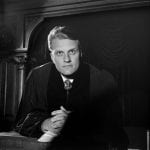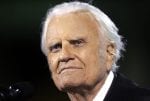My journey into Billy Graham’s life was absolutely fascinating! I always loved M. Graham and his teachings but I thought, even if he inspired millions of people around the world, for sure, he must have gotten some inspiration from those who were closest to him.
Who was Billy Graham?
I’m convinced most people know who Billy Graham was unless you live under a rock! But just in case some of you don’t know who this man was…
The Christian evangelist William Franklin Graham was born on November 7, 1918, in Charlotte, North Carolina. Billy Graham was an evangelist at revival meetings and on radio and television for over 40 years. He was basically the greatest evangelist there ever was. He preached the Christian gospel to as many as 220 million people in live audiences over 185 countries. He was credited with preaching to more individuals than anyone else in history, not counting the additional millions he has addressed through radio, television and the written word.
How it all started for Billy
It was a traveling evangelist Mordecai Ham, who would set Graham on a profound spiritual path. At the age of 16, he attended a series of revival meetings done by M. Ham and his sermons really spoke to him. After high school, he enrolled in a conservative Christian school and later to the Florida Bible Institute. After graduating from the Florida Bible Institute with a bachelor in theology, Graham moved to Illinois and he enrolled at Wheaton College for further spiritual training. At the tender age of 19, he got baptized in a southern Baptist Church and one year later, he was ordained.
It was there, at Wheaton’s College that he met, Ruth McCue Bell, who would later become his wife.
Then came Ruth
Ruth was born in China in 1920. Her parents, Dr. Nelson Bell and Virginia McCue Bell, were medical missionaries with the Presbyterian Hospital. Ruth never intended to marry, since she knew how hard the life of a missionary was but all changed when she met Billy at age 17, in 1937. She said, she loved Billy’s gentle spirit and prayed to God, she would be able to serve Him, with Billy, whom she wished would become her husband.
Ruth was an amazing Christian author and Billy respected her work very much. He was very proud of what she was accomplishing as a mother and as a writer. He said about his wife, that she was also a marvellous cook and a fabulous mother. He often turned to her for advice about his ministry. Often being away from home, He was so respectful of his wife that he swore he would never be alone with another woman other than her. He would ask members of his team, to go into his hotel room and check before he came in, just in case a fan might be there waiting for him. He also shared that his greatest temptation was wanting on a few occasion, to not listen to God and his calling because he wished he could stay home with his wife and children. He found leaving them to be very hard. He struggled many times with that. But he also knew how is calling was important and he did not want to disobey God.
Ruth knew how important her role was as a wife and mother. She treasured her role as Billy’s confident, advisor, administrator and closest friend. She preferred to stay away from the spotlight and was more at ease working behind the scenes. She helped him with the research for his books and was a very important helper when came time to prepare his sermons. She was an amazing writer and poet and she authored as well as coauthored 14 books.
Billy had Ruth as a firm anchor, she would stand by him and make sure he stood firm whenever he would become tempted to dive into politics which fascinated him so. In 1964, when rumors were circulating about Billy Graham running for the White House, she told him boldly, “If you run, I don’t think the country will elect a divorced president”.
Ruth always helped her husband who was always facing many temptations. She was a strong and talented woman. She was a gifted evangelist too but a more private one. She was sharing the gospel with their circle of friends including the First Families.
Reverend Graham’s wife had also a very witty sense of humour. Barbara Bush once said, that Ruth had been asked if she ever thought about divorce, she answered: “ Divorce? No. Murder? Yes”.
Like M. Graham said many times, he could not have done what he has, if it was not for the support of his dear and beloved wife who inspired him so. She was behind the scenes most of the time, but played a major role in Billy Graham’s life and who he became, which is the greatest evangelist there ever was.
-Smile.











